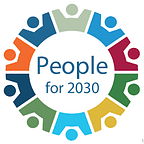People Champion Spotlight: Edith Assani
People for 2030 is fortunate to have some very talented People Champions who embody and inspire change in their respective Country Offices. The Spotlight series aims to highlight them and their efforts. With each Bulletin, we will be featuring an interview with the hope that reading their story motivates our readers as much as collaborating with them energizes us.
For this People Champion Spotlight, we spoke to Edith Assani, Environment and Energy Programme Officer at UNDP Central African Republic, to learn about her work in the Country Office.
Edith has been working at UNDP for 15 years on numerous environmental projects that ensure access to affordable, reliable, sustainable energy for all. In addition to this, she has been the President of the Country Office’s Staff Association (2015–2017) and currently supports the implementation of People for 2030 in CAR as the People Champion.
With these five questions, we shine a light on Edith’s dual passion for the environment and people development.
Q1. How has your career evolved since starting at UNDP?
I joined UNDP in September 2007 as the Assistant to the Resident Representative.
I then moved on to become the Environment and Energy Programme Manager from 2012 to 2015. This position corresponded more with my background as I hold a Master’s degree in Private Law and a Diploma of Advanced Professional Study in Environmental Management.
Thereafter, I took up the position of a Monitoring and Evaluation Specialist during the political and military crisis in the country from 2015 to 2017, when all environmental projects were suspended in the Country. Working as a Monitoring and Evaluation Specialist for 2 years, allowed me to acquire skills which are an asset in the management of the projects and programmes I am currently in charge of in my role as the Environment and Energy Program Officer — a position I started in 2017.
The best lesson learned in almost 15 years of my career is that you have to embrace open-mindedness and readiness to learn. Because of those two, I have gained a lot of invaluable knowledge in the time that I have spent in this organization.
Q2. What has been your favorite project at UNDP? And why?
My favourite project has to be the one we implemented in June 2018.
It was aimed at the Promotion of Small Hydropower Plants with mini distribution networks for better access to modern energy services in the Central African Republic. The goal was to build 4 small hydropower plants of 500 kw in 4 rural localities to allow 15,000 households to have access to clean electricity at a lower cost. While contributing to the socio-economic development of rural regions, the project also contributes to improving the rate of access to electricity, which is almost zero in rural areas and ultimately to achieving SDG 7 — affordable and clean energy. I believe that this is one of the most important SDGs because access to electricity is at the centre of development: there can be no development without energy.
Q3. What motivated you to become a People Champion?
I was the President of UNDP/UNV/UNFPA/UNOPS/UNWOMEN Central African Republic’s Staff Association between 2015 and 2017. This experience instilled in me a deep commitment towards building a sense of community amongst colleagues in the workplace and representing their interests. This motivated me to continue work in this area and inspired me to take up this new adventure of being a People Champion.
Q4. As a People Champion, what is one initiative that you have implemented in your CO to transform the work culture?
I believe People for 2030’s recommendation to incorporate a “continuous learning model” is an important one because there are numerous learning opportunities out there. For example, colleagues can learn so much from each other’s experience and also through exposure to assignments, networking and coaching avenues. Building on this thinking, we activated “Learning Lunches” in UNDP Central African Republic through which we encouraged the exchange and sharing of information amongst personnel on various topics such as career development, gender equality and the SPARK Programme for which colleagues Christine Meta Mpinda (Sexual and Gender-based Violence Specialist), Yolanda Romero (Communications Officer) and Ozlem Celebi (Justice Specialist) and I had registered.
Q5. What’s a fun fact about you many people may not know?
Well, in another life, I was a professional theater actress. I travelled across Africa, Europe and America as a performer and sometimes even in front of personalities such as Prince Philippe of Belgium!
